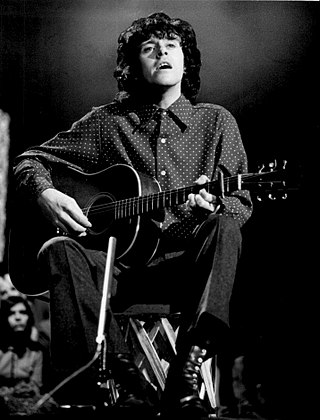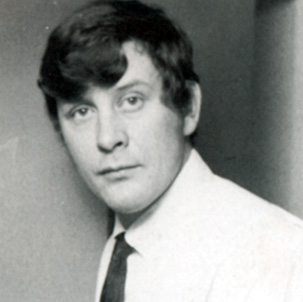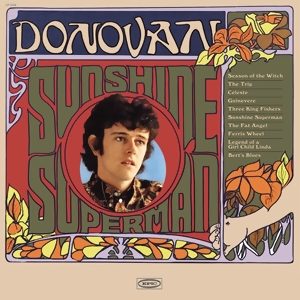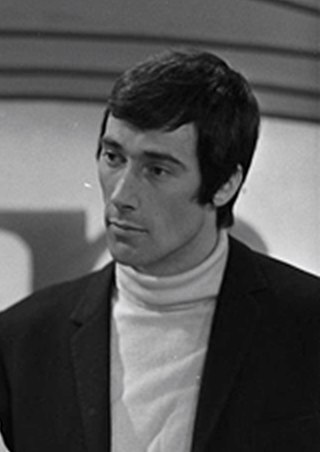Related Research Articles

Donovan Phillips Leitch, known mononymously as Donovan, is a Scottish musician, songwriter and record producer. He emerged from the British folk scene in early 1965, and subsequently scored multiple international hit singles and albums during the late 1960s. His work became emblematic of the flower power era with its blend of folk, pop, psychedelic rock, and jazz stylings.
Harold McNair was a Jamaican-born saxophonist and flautist.

Michael Peter Hayes, known as Mickie Most, was an English record producer behind scores of hit singles for acts such as the Animals, Herman's Hermits, the Nashville Teens, Donovan, Lulu, Suzi Quatro, Hot Chocolate, Arrows, Racey and the Jeff Beck Group, often issued on his own RAK Records label.

"Sunshine Superman" is a song written and recorded by Scottish singer-songwriter Donovan. It was released as a single in the United States through Epic Records in July 1966, but due to a contractual dispute the United Kingdom release was delayed until December 1966, where it appeared on Donovan's previous label, Pye Records. The single was backed with "The Trip" on both the US and UK releases. It has been described as "[one of the] classics of the era", and as "the quintessential bright summer sing along".

Sunshine Superman is the third studio album by Scottish singer-songwriter Donovan. It was released in the United States on August 26, 1966, but was not released in the UK because of a contractual dispute. In June 1967, a compilation of tracks from this album and the follow-up Mellow Yellow was released as Sunshine Superman in the UK.

Mellow Yellow is the fourth album from Scottish singer-songwriter Donovan. It was released in the US in February 1967 (Epic Records LN 24239 / BN 26239, but not released in the UK because of a continuing contractual dispute that also prevented Sunshine Superman from a UK release. In June 1967, a cross-section of both albums was released as Sunshine Superman in the UK. "Mellow Yellow" was the name of Donovan's hit single released the previous November.

The Hurdy Gurdy Man is the sixth studio album by Scottish singer-songwriter Donovan. It was released in the US in October 1968 on Epic Records, but not in the UK due to a continuing contractual dispute that also prevented Sunshine Superman (1966) and Mellow Yellow (1967) from being released there. A songbook of lead sheets to the album was nonetheless issued in both countries.

Barabajagal is the seventh studio album and eighth album overall from British singer-songwriter Donovan. It was released by Epic Records in the United States on 11 August 1969, but was not released in the United Kingdom because of a continuing contractual dispute that also prevented Sunshine Superman, Mellow Yellow, and The Hurdy Gurdy Man from being released in the UK.

Lady of the Stars is the seventeenth studio album, and nineteenth album overall, by the Scottish singer-songwriter Donovan. It was released in the UK in 1983 and the US in January 1984.
John Valmore Pearson was a British composer, orchestra leader and pianist. He led the Top of the Pops orchestra for sixteen years, wrote a catalogue of library music, and had many of his pieces used as the theme music to television series.

CCS, sometimes written as C.C.S., was a British musical group, led by blues guitarist Alexis Korner. The name was derived as an abbreviation of Collective Consciousness Society.

Roger Frederick Cook is an English singer, songwriter and record producer, who has written many hit records for other recording artists. He has also had a successful recording career in his own right.

"Alfie" is a song written by Burt Bacharach and Hal David to promote the 1966 film Alfie. The song was a major hit for Cilla Black (UK) and Dionne Warwick (US).
John T. Klemmer is an American saxophonist, composer, songwriter, and arranger.
John Worsley, more widely known under the pseudonyms Les Vandyke and Johnny Worth, was an English popular music songwriter from the 1950s to the 1980s, who started his career as a singer.

"Hurdy Gurdy Man" is a song by the Scottish singer-songwriter Donovan. It was recorded in April 1968 and released the following month as a single. The song gave its name to the album The Hurdy Gurdy Man, which was released in October of that year in the United States. The single reached number 5 on the Billboard Hot 100 in the U.S. and number 4 on the UK Singles Chart.

This is the discography of Scottish singer, songwriter and guitarist Donovan.

The Best Band in the Land is the third and final studio album of CCS. It was recorded at Abbey Road Studios in London, January to May 1973 and released in September that year. In Australia, the album was titled The Band Played the Boogie.
Johnnie Spence, born John Spence Abrahams, sometimes spelt Johnny Spence, was a British musical arranger, director, and orchestra leader. He is credited with the arrangements and musical direction of numerous records and television light entertainment works throughout the 1960s and 1970s, and was nominated for an Emmy Award for Outstanding Achievement in Music Direction of a Variety, Musical or Dramatic Program for his work on the 1969 television series This Is Tom Jones.
Gregory Bowen is a Welsh trumpet player. His primary work was done in London before relocating to Berlin, Germany in 1976. Since 1961, Bowen has performed and recorded with jazz, pop artists and entertainers from Europe and North America on records, soundtracks and T.V. broadcasts. Most notable is his lead trumpet work on the James Bond film soundtracks Goldfinger, Thunderball and You Only Live Twice.
References
- ↑ "John Cameron". IMDb.com. Retrieved 14 May 2014.
- 1 2 3 4 Johnnie Johnstone, "Just Say Yes!", Shindig!, #119, September 2021, pp. 56-61
- ↑ 'Tripos Examination Results', The Times , 11 June 1965.
- ↑ "John Cameron on Harold McNair", JazzWax.com. Retrieved 15 September 2022
- 1 2 3 4 5 6 7 8 "BIOGRAPHY :: John Cameron". Johncameronmusic.com. Archived from the original on 13 July 2011. Retrieved 14 May 2014.
- ↑ "CREDIT LIST :: John Cameron". Johncameronmusic.com. Retrieved 14 May 2014.
- ↑ "Kes". IMDb.com. Retrieved 14 May 2014.
- ↑ "Thunderthighs - Central Park Arrest". Discogs.com. 20 June 1974. Retrieved 20 May 2023.
- ↑ "John Cameron", Zorro.com. Retrieved 16 April 2022